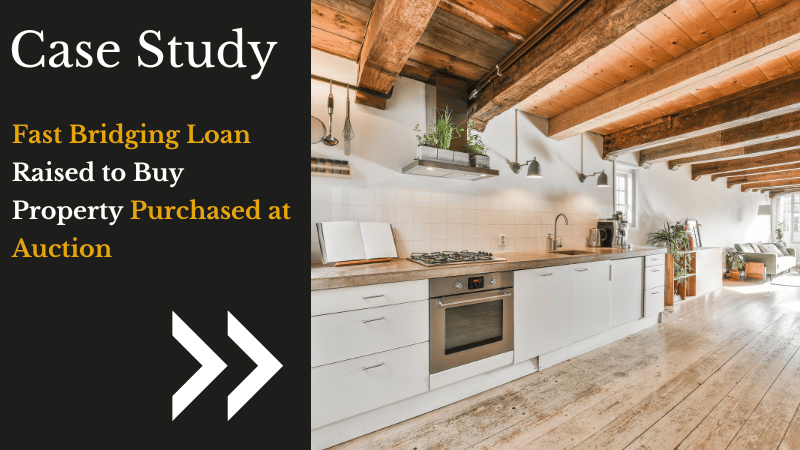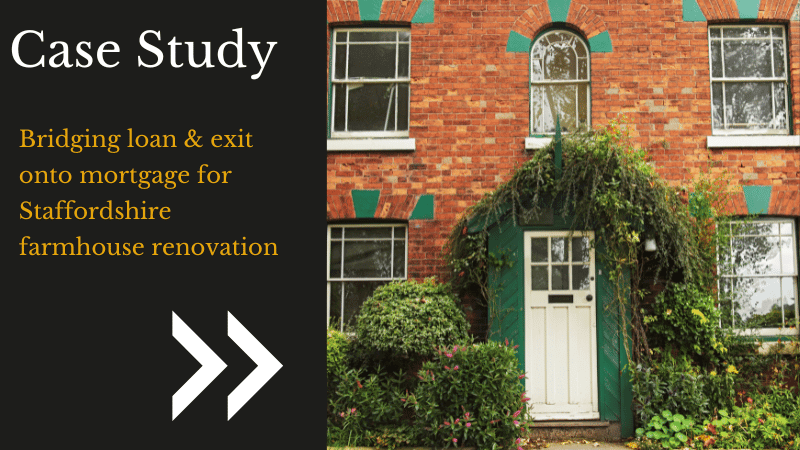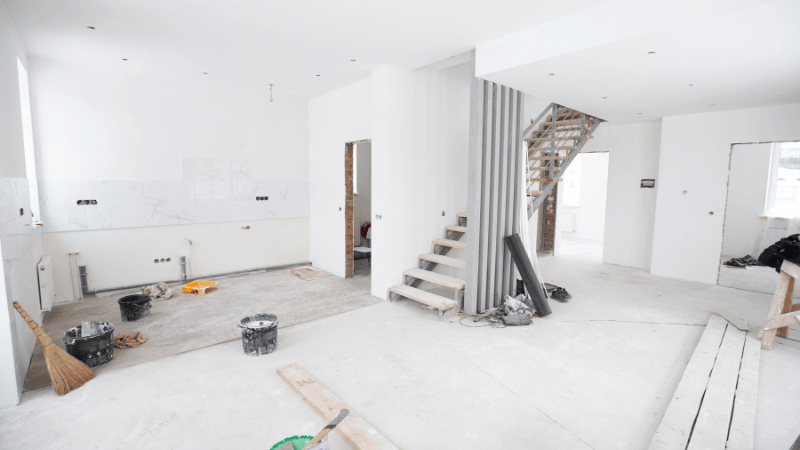Categories
Bridging Finance vs Mortgage: Which Is the Right Choice for You?

When you’re buying property, the financing that comes to mind is likely a mortgage. Mortgages have been the primary way to finance a house purchase since the dawn of the property market, but they’re not the only option.
Bridging loans provide a short-term alternative to the traditional mortgage, designed to facilitate rapid house purchases without waiting for the more complicated and strict terms that come with a mortgage application.
So, if you’re looking at buying a property that needs a little more speed and flexibility than a traditional mortgage, does bridging finance offer what you need?
Key Takeaways
- Bridging finance is a short-term, fast, and flexible alternative to traditional mortgages, ideal for scenarios requiring quick property purchases, such as auctions or chain breaks.
- Mortgages are long-term solutions with lower interest rates, but they come with stricter eligibility criteria, slower processing times, and are typically unsuitable for properties needing significant renovation.
- Bridging finance offers flexibility in underwriting, often not requiring traditional affordability tests, making them suitable for fast transactions, renovation projects, and unique rural properties.
- Both finance options are secured against property, involve interest and fees, can be refinanced, and are best arranged through specialist brokers like Clifton Private Finance.
- Exit strategies for bridging finance are essential and typically involve refinancing with a mortgage or selling a property to repay the loan in full.
- Bridging finance carries higher costs and risk, including higher interest rates and the potential for property repossession if the exit strategy fails, making expert advice vital.
- Deposits for bridging finance depend on equity rather than cash, and loans are based on loan-to-value (LTV) ratios-typically between 60% and 75%.
Get started with our calculator
Bridging Finance vs. Mortgages - The Key Differences
The differences between mortgages and bridging finance come because each is designed for a different purpose. It’s not simply a case of ‘this one is better’, as each has its advantages and disadvantages and works best when used correctly.
Mortgages are:
- Long-term solutions designed to lend you money to buy a property and be paid back over many years
- Subject to stringent underwriting criteria which include affordability and stress testing, as well as comprehensive credit checks
- Slow to put in place, with lengthy application procedures
- Strict about the standard of the property, ensuring it is suitable for habitation
- Repaid through regular monthly repayments
- Generally low-interest loans with competitive rates
Bridging Finance is:
- Short-term finance designed to give you the buying power to take immediate advantage of opportunities
- Developed around asset-based securities (the property) with a smaller focus on traditional credit history and income
- Quick to secure, with a rapid application process
- Suitable for use with property that requires renovation or bought at auction
- Repaid through an ‘exit strategy’ in one lump sum
- Higher interest loans to offset greater lender risk
To understand bridging finance in greater detail, look to our thorough guide to bridging loans.
Bridging Finance vs. Mortgages - The 4 Similarities
There are many ways in which bridging finance and mortgages work in a similar way. Understanding these helps when evaluating which product is right for you.

Secured on property
Both types of finance are secured asset-based loans that are tied to your property as collateral. This lowers the risk for the lender who has the security that the property can be sold to clear the debt should it become necessary. Asset-based loans have lower interest rates and can be obtained for larger amounts than unsecured alternatives.

Interest and fees
The cost of the finance is structured through both the ongoing accruing of interest, and set fees. While the size of these is different and specific to each individual deal, you will have to pay an additional amount to the lender for the finance.

Can be refinanced
Both bridging finance and mortgages are flexible enough that they can be refinanced if circumstances change, giving you options in times of difficulty. In some cases, refinancing may incur additional fees.

Best obtained through a broker
High-value finance can be complicated and is best applied for with the help of a specialist. Professional brokers like Clifton Private Finance offer expertise and access to the full market of lenders, enabling you to find a property finance product that matches your specific needs.
Recent Bridging Finance Case Studies
Why Use Bridging Finance Instead of a Mortgage?
Bridging finance is not a replacement for a mortgage. Instead, it is a different product designed to serve a different need. In many cases, bridging finance forms part of a long-term funding plan that also includes a mortgage.
Bridging finance has two main components that make it more suitable in specialist situations than a mortgage, it’s speed and it’s flexible eligibility.
Looking at Bridging Finance Speed
The speed of bridging finance allows you to take advantage of opportunities that arise. Mortgages can take months to put into place, meaning often the deal is done and someone else has secured the property while you’re still handling paperwork.
Consider the example of an auction property. Auction purchases must be completed - paid in full - within 28 days. It’s a timeline that’s far too short for a standard mortgage and often people interested in auctioned houses wonder if they need the cash in the bank before they can even consider looking at the properties on offer.
Other examples where speed is of the essence include:
- Avoiding the problem of gazumping - You can use bridging finance to get contracts exchanged far faster, getting the property in your hands before a competitor can put in their offer.
- Fixing a break in the property chain - If you were selling your house to move on and your buyer pulls out, bridging finance lets you keep your place in the property chain and get your new home while your old one goes back on the market for a while.
- Helping with care home costs - If a parent or elderly relative suffers a health problem and needs to move from their home to full-time residential care, bridging finance can make sure the money is in place to pay for the care costs while their house goes on the market.
Looking at Bridging Finance Flexibility
The underwriting for mortgages is extremely thorough. One consideration mortgage underwriters need to take into account is the long-term viability of both the property and you as a borrower.
Mortgage affordability tests can be a difficult hurdle to leap and they are hard to get when you’re looking at a rundown property, with lenders unwilling to secure a mortgage on a building that’s uninhabitable.
Imagine a refurbishment project where you’re looking to flip a property - buy it for a low cost at auction, spend enough to renovate and bring it up to a quality modern style and specification, and then sell it on. With bridging finance, you can secure enough to buy the house, even if it’s a little worse for wear, and get enough extra on the loan to pay for the cost of development and renovation. Once the property sells, pay back the bridging finance and enjoy the profit.
Other examples where the flexibility of bridging finance shines are:
- Getting a new job - If you’re looking to purchase a property to move to a new job, bridging finance can offer a flexible answer to the mortgage affordability test, enabling you to buy the property with a view to obtaining a mortgage once you’re settled.
- Buying a rural property before it’s on the grid - If you want to purchase a smallholding or middle-of-nowhere cottage, you may find that a mortgage is impossible until it’s brought to modern standards. Bridging finance means you can get the home, pay to have to connected to mains water and electricity, and secure the mortgage you need.
- Self-employed - Many traditional mortgages are out of reach for self-employed individuals, especially in the early days of starting a business. A bridging solution will give you the money you need to buy a home while you build up your company, switching over to a mortgage once you have the paperwork needed for approval.
The Exit Strategy Explained
Unlike a traditional mortgage, bridging finance is not repaid with a regular monthly direct debit. Instead, the bridging finance is paid off in full at the end of the term, along with any accumulated fees and interest. This is done through means of an exit or exit strategy. Your exit strategy is a plan put in place at the start of the financing that describes how the debt will be cleared.
Typical exit strategies include:
- Mortgage - With the bridging finance in place, there is time to focus on a long-term mortgage application. If you are planning to keep the property, then a mortgage exit strategy is the most normal to pursue. This could be a residential mortgage if you are living in the house, or a buy-to-let interest-only mortgage if it is to be rented out. The mortgage is obtained to cover the full cost of the bridging finance.
- Sale of the property - Many projects, including ‘house flipping’, involve the sale of the property for profit once renovations have been completed. This forms the second standard exit strategy.
- Sale of another property - When you obtain bridging finance to speed up the house buying process, it is typically repaid using the proceeds from your old house sale.
Some bridging exit strategies involve a combination of the main exits. For example, you may be moving into a more valuable property than the one you left, combining a new mortgage with the sale of your original property for the exit.
The Costs and Risks of Bridging Finance vs Mortgages
When evaluating bridging finance vs. mortgages, it’s essential to consider the potential downsides. Because of its structure, bridging finance has a different level of interest and fees.
Bridging Finance vs. Mortgage Costs Compared
|
|
Bridging Finance |
Mortgage |
|
Interest rate |
Higher rates that are calculated daily |
Low rates over long terms |
|
Overall interest paid |
Short term and daily calculation leads to minimising cost of interest |
Long term leads to high interest total |
|
Arrangement fee |
Typically between 1.5% and 2% |
Often 1% |
|
Broker fees |
~£995 |
From £295 + 0.5% |
|
Legal fees |
Standard fees for conveyancing and surveys |
Standard fees for conveyancing and surveys |
These are fully explained in our in-depth article The Cost of Bridging Finance, which details:
- Bridging finance arrangement fees
- Bridging finance interest rates and how interest is charged
- Any associated broker fees
- Legal fees and other considerations
Alternatively, use our bridging loan calculator for a detailed breakdown estimate of your potential bridging finance.
It is vital that you understand the specific nature of your bridging finance and how it may affect you in the future. Discussing your situation with an expert ensures that you are able to make informed decisions and move forward confidently with your bridging finance.
The bridging team at Clifton Private Finance are here to answer any questions you may have and discuss your circumstances with you in full to help you get the best finance for your property purchase.
Bridging vs. Mortgage Deposits and Equity
One question that’s often asked regarding bridging finance is ‘what deposit do I need?’.
Many people choosing bridging finance are not first-time buyers, but those moving from one home to another, or new investors looking to get a return through the property market. In those instances, the bridging finance can be secured against two properties - the one being purchased, and the existing property.
For those who have no existing property, bridging finance will only provide a portion of the money needed for a full purchase, with LTV typically being between 75% and 60%. Additional investment, identical to a deposit, would be needed to cover the remainder.
This can be illustrated with the following examples.
Example 1: Bridging Finance to Move Properties
Simon and Susan are looking to move to a new home. They have found a house at auction with a guide price of £600,000 that will need some renovations for which they budget a further £100,000. They are planning to sell their current home, valued at £540,000, pay off the remainder of the existing mortgage, standing at £110,000, and obtain a new mortgage as an exit strategy to clear the bridging finance.
The figures are as follows:
- Loan capital required: £700,000
- Total costs (estimated fees, interest, and other costs over 12 months): £70,000
- Bridging finance total (capital plus costs): £770,000
- Existing equity (current house value less existing mortgage): £430,000
- Full expected security (existing equity plus new property value): £1,030,000
- Loan-to-value (finance to security ratio): 74.76%
The couple pay off their bridging finance using their proceeds from the sale of their house and the new mortgage as follows:
- True bridging finance costs (after 8 months and saving £20,000 thanks to the early repayment): £50,000
- Total to repay (loan capital plus costs): £750,000
- Capital from house sale: £545,000
- Capital remaining from renovations budget (initial budget less actual renovation cost): £11,000
- Mortgage obtained (total repay less total capital available): £194,000
Example 2: Bridging Finance to Get a Cheap First Home
Ali is living with his parents and desperate to get on the property ladder. His work as a construction labourer is classed as self-employed and though he earns a reasonable amount, he needs one more year of accounts before he’d qualify for a decent mortgage. He’s confident that he can project manage a renovation and decides to look at the auctions market to see if he can get a cheap property to do up. He has £20,000 saved which he’s happy to invest.
As he’s only looking for a small house in South Wales, Ali finds a range of suitable auction properties in the £50,000 range. Impulsively, he bids and wins a property for £43,000 at his first auction without having any finance in place. He pays the 10% deposit of £4,300 and realises he must find the rest of the money within 28 days or risk losing the deposit.
Nonetheless, with Clifton’s help, Ali secures a deal with a specialist lender based on a future valuation of the post-renovated property of £60,000. The best deal available is for 65% LTV with slightly higher than average interest and fees. This gives Ali £39,000 of additional capital - it will pay for the property, but even with the remainder of his savings will leave him a little short for renovations. Even so, with consideration and full understanding of the costs, Ali accepts the finance and determines to focus his spare time and all his disposable income on the renovations.
Ali completes the work in ten months, using all his savings and spare income, plus a loan of £10,000 from his parents, which he plans to pay back as soon as he can.
- Bridging finance: £39,000
- Bridging costs (after ten months inc. fees): £6,000
- Personal investment (savings plus income): £25,000
- Loan from parents: £10,000
- Total cost of property: £80,000
Ali’s total debt equals £55,000, including the bridging finance, associated costs, and the £10,000 loan from his parents. With Clifton Private Finance to advise and help, Ali secures a mortgage for £55,000, representing an LTV of 55% based on a valuation of his finished house at £100,000. He efficiently exits the bridging finance, clears his debt to his parents, and officially moves into his beautiful new home.
Bridging Finance and Mortgages with Clifton Private Finance
With greater speed and flexibility, bridging finance provides an essential solution to the gap between the fast-paced reality of property purchase, renovation, and investment, and the slower underwriting process of mortgages.
We at Clifton Private Finance are experts in the property finance arena, with specialist teams working with the wide range of bridging finance and mortgage lenders across the UK.
To move rapidly forward in the exciting UK property market, speak to Clifton Private Finance today.
Get started with our calculator

Fergus Allen
Head of Bridging
Let us do all the hard work of finding the right bridging lender for your circumstances.
We secure bridging finance for applications of all types, and we negotiate competitive lending to meet your needs and timescale.
















